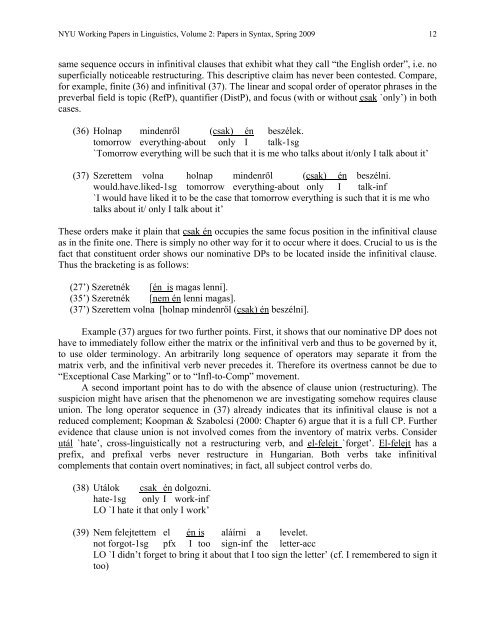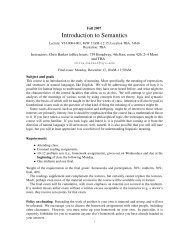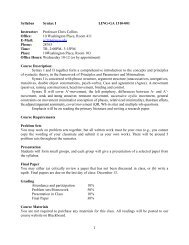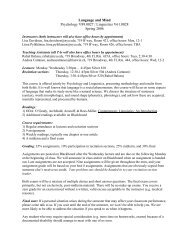Overt Nominative Subjects in Infinitival Complements Cross - NYU ...
Overt Nominative Subjects in Infinitival Complements Cross - NYU ...
Overt Nominative Subjects in Infinitival Complements Cross - NYU ...
You also want an ePaper? Increase the reach of your titles
YUMPU automatically turns print PDFs into web optimized ePapers that Google loves.
<strong>NYU</strong> Work<strong>in</strong>g Papers <strong>in</strong> L<strong>in</strong>guistics, Volume 2: Papers <strong>in</strong> Syntax, Spr<strong>in</strong>g 2009 12same sequence occurs <strong>in</strong> <strong>in</strong>f<strong>in</strong>itival clauses that exhibit what they call “the English order”, i.e. nosuperficially noticeable restructur<strong>in</strong>g. This descriptive claim has never been contested. Compare,for example, f<strong>in</strong>ite (36) and <strong>in</strong>f<strong>in</strong>itival (37). The l<strong>in</strong>ear and scopal order of operator phrases <strong>in</strong> thepreverbal field is topic (RefP), quantifier (DistP), and focus (with or without csak `only’) <strong>in</strong> bothcases.(36) Holnap m<strong>in</strong>denről (csak) én beszélek.tomorrow everyth<strong>in</strong>g-about only I talk-1sg`Tomorrow everyth<strong>in</strong>g will be such that it is me who talks about it/only I talk about it’(37) Szerettem volna holnap m<strong>in</strong>denről (csak) én beszélni.would.have.liked-1sg tomorrow everyth<strong>in</strong>g-about only I talk-<strong>in</strong>f`I would have liked it to be the case that tomorrow everyth<strong>in</strong>g is such that it is me whotalks about it/ only I talk about it’These orders make it pla<strong>in</strong> that csak én occupies the same focus position <strong>in</strong> the <strong>in</strong>f<strong>in</strong>itival clauseas <strong>in</strong> the f<strong>in</strong>ite one. There is simply no other way for it to occur where it does. Crucial to us is thefact that constituent order shows our nom<strong>in</strong>ative DPs to be located <strong>in</strong>side the <strong>in</strong>f<strong>in</strong>itival clause.Thus the bracket<strong>in</strong>g is as follows:(27’) Szeretnék [én is magas lenni].(35’) Szeretnék [nem én lenni magas].(37’) Szerettem volna [holnap m<strong>in</strong>denről (csak) én beszélni].Example (37) argues for two further po<strong>in</strong>ts. First, it shows that our nom<strong>in</strong>ative DP does nothave to immediately follow either the matrix or the <strong>in</strong>f<strong>in</strong>itival verb and thus to be governed by it,to use older term<strong>in</strong>ology. An arbitrarily long sequence of operators may separate it from thematrix verb, and the <strong>in</strong>f<strong>in</strong>itival verb never precedes it. Therefore its overtness cannot be due to“Exceptional Case Mark<strong>in</strong>g” or to “Infl-to-Comp” movement.A second important po<strong>in</strong>t has to do with the absence of clause union (restructur<strong>in</strong>g). Thesuspicion might have arisen that the phenomenon we are <strong>in</strong>vestigat<strong>in</strong>g somehow requires clauseunion. The long operator sequence <strong>in</strong> (37) already <strong>in</strong>dicates that its <strong>in</strong>f<strong>in</strong>itival clause is not areduced complement; Koopman & Szabolcsi (2000: Chapter 6) argue that it is a full CP. Furtherevidence that clause union is not <strong>in</strong>volved comes from the <strong>in</strong>ventory of matrix verbs. Considerutál `hate’, cross-l<strong>in</strong>guistically not a restructur<strong>in</strong>g verb, and el-felejt `forget’. El-felejt has aprefix, and prefixal verbs never restructure <strong>in</strong> Hungarian. Both verbs take <strong>in</strong>f<strong>in</strong>itivalcomplements that conta<strong>in</strong> overt nom<strong>in</strong>atives; <strong>in</strong> fact, all subject control verbs do.(38) Utálok csak én dolgozni.hate-1sg only I work-<strong>in</strong>fLO `I hate it that only I work’(39) Nem felejtettem el én is aláírni a levelet.not forgot-1sg pfx I too sign-<strong>in</strong>f the letter-accLO `I didn’t forget to br<strong>in</strong>g it about that I too sign the letter’ (cf. I remembered to sign ittoo)








